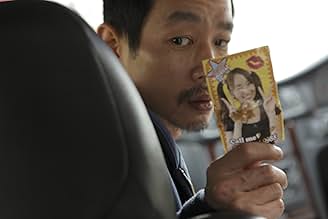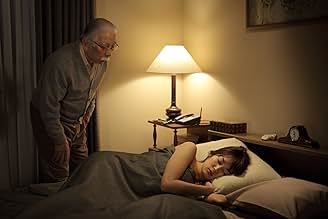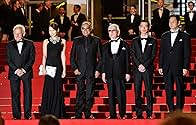PUNTUACIÓN EN IMDb
7,0/10
14 mil
TU PUNTUACIÓN
En Tokio, una joven trabajadora del sexo establece una conexión inesperada con un viudo durante dos días.En Tokio, una joven trabajadora del sexo establece una conexión inesperada con un viudo durante dos días.En Tokio, una joven trabajadora del sexo establece una conexión inesperada con un viudo durante dos días.
- Dirección
- Guión
- Reparto principal
- Premios
- 1 premio y 6 nominaciones en total
Kôichi Ôhori
- Taxi Driver
- (as Kouichi Ohori)
Ryota Nakanishi
- Student
- (sin acreditar)
Reseñas destacadas
"Like Someone in Love" is Abbas Kiarostami's follow-up to the mind- bending relationship drama "Certified Copy". Dissection of the title alone provides so many interesting clues and directions for the film to take in addition to what was analyzed previously. And while it does in fact address those interesting ideas (indirectly), it is as minimal as any film-going audience could possibly stand. We essentially watch an unexplained relationship unfold in almost real-time (just under 24 hours).
Akiko (Rin Takashi) is a college-aged girl up to something in the big city of Tokyo that is probably not good for her. She's having an argument with her boyfriend on the phone and she's saying no to a job that a middle-aged man is offering her. This middle-aged man is clearly her pimp and "no" means "yes, sir, I will do whatever you tell me to." So into the cab Akiko goes and we begin to worry about her safety. We spent an awful long time worrying about her safety with no idea what lies ahead for her. The cab ride was two hours long and we saw a lot of it. Akiko arrives at the apartment of an older gentleman looking for companionship. We don't really know what exactly Takashi Watanabe (Tadashi Okuno) wanted with Akiko, and then in the morning he drives her back to Tokyo. Another long car ride.
Visually the car rides were impeccably shot. The scenery was reflected in the windshield and we could still see the characters' faces behind. Unfortunately we don't really know what's happening with these characters during these long car rides. Sometimes a car ride is just a car ride.
Eventually we meet Noriaki (Ryo Kase), Akiko's offensive boyfriend. And he starts putting the relationships into perspective. A different perspective. He allows Akiko and Watanabe to act differently than they actually are, which allows us to start seeing them as they actually are. And then it ends. Well, not quite that quickly, but without giving anything away, it ends.
We're given so little on screen to examine that it can be frustrating even to the viewers that appreciate the subtle beauty in film. Two weeks after first seeing it, my mind has started to form a few opinions on what was being said but it's still a bit too little, too late.
Akiko (Rin Takashi) is a college-aged girl up to something in the big city of Tokyo that is probably not good for her. She's having an argument with her boyfriend on the phone and she's saying no to a job that a middle-aged man is offering her. This middle-aged man is clearly her pimp and "no" means "yes, sir, I will do whatever you tell me to." So into the cab Akiko goes and we begin to worry about her safety. We spent an awful long time worrying about her safety with no idea what lies ahead for her. The cab ride was two hours long and we saw a lot of it. Akiko arrives at the apartment of an older gentleman looking for companionship. We don't really know what exactly Takashi Watanabe (Tadashi Okuno) wanted with Akiko, and then in the morning he drives her back to Tokyo. Another long car ride.
Visually the car rides were impeccably shot. The scenery was reflected in the windshield and we could still see the characters' faces behind. Unfortunately we don't really know what's happening with these characters during these long car rides. Sometimes a car ride is just a car ride.
Eventually we meet Noriaki (Ryo Kase), Akiko's offensive boyfriend. And he starts putting the relationships into perspective. A different perspective. He allows Akiko and Watanabe to act differently than they actually are, which allows us to start seeing them as they actually are. And then it ends. Well, not quite that quickly, but without giving anything away, it ends.
We're given so little on screen to examine that it can be frustrating even to the viewers that appreciate the subtle beauty in film. Two weeks after first seeing it, my mind has started to form a few opinions on what was being said but it's still a bit too little, too late.
10mkian
I watched this movie on silver screen twice up to now and I'm sure I can check it out ten more times and still enjoy it. It's definitely a minimal piece of art but it's as deep as life. It looks simple but it doesn't mean you can't elaborate. Kiarostami highlights lifelike stories. Stories which belong to us, ordinary people! Aren't they important? And Kiarostami doesn't conceal this fact that he likes Haiku and Japanese culture but he doesn't have any idea how this feelings came up to him. He started writing poems that resembled Haiku when he was just 20! The serene, nonchalant, and often profoundly philosophical language of haiku allows the poet to swiftly touch on the core of the universal human condition: love, despair, humor, death; as his movies do and now Kiarostami made his last movie (and one of the best ones) where Haiku was blossomed: Japan. All these said, I can't ignore the innovative cinematographic techniques he used in "Like Someone in Love" that adds to the beauty of this movie. Remember the first scene in the bar with Camera fixed on a table, the girl is talking in behind while we see other people activities. We don't know what we should track. The other scenes in the car which camera plays with lights and shadows are just magnificent. I'm really amazed how delicately he sets up these all. Every detail is deliberated. Briefly, if you are bored of the stupid stories we see in the movies nowadays and instead want to know what's behind go and check this out.
Like Someone in Love (2012) is a Japanese movie written and directed by the great Iranian filmmaker Abbas Kiarostami. Kiarostami brings his quiet, thoughtful style to a culture that is surely very alien to him. Japanese viewers may note cultural errors in the movie. My thought is that Kiarostami can look beyond cultural differences to universal themes.
The movie, set in Tokyo, stars Rin Takanashi as Akiko, a young provincial woman who is a call girl. (She doesn't walk the streets. She works out of a bar, whose owner arranges the sessions at people's homes.) As the movie opens Akiko is facing two immediate problems. Her jealous boyfriend is on the phone, demanding to know where she is. Akiko is a college student, and her boyfriend is aware of that. He doesn't know that she's a prostitute, but he can sense that something isn't right, and he suspects her of cheating.
Akiko's grandmother is visiting Tokyo that day, and desperately wants to see Akiko. Akiko would love to meet with her, but the bar owner is adamant--she must go out on a call to an important client. The client is Professor Takashi Watanabe, played by Tadasi Okuno. Akiko has no choice but to ignore her grandmother and visit the professor's apartment.
Prof. Watanabe is a gentle, lonely widower. He has prepared a special dinner for Akiko, and he's playing Western music. (It's Ella Fitzgerald singing "Like Someone in Love.") It's more like a seduction scene than a paid sexual encounter.
Akiko spends the night at the professor's home, and he drives her to the university the next morning. It's at that point that the film takes a different turn, because Akiko's violent boyfriend confronts her on the university steps.
All of this action takes place in the first third of the movie. In the remainder of the film, Kiarostami continues to explore this unusual and somewhat threatening love triangle. This interaction among three very different individuals provides a fascinating look into human relationships. Where these relationships will lead isn't always obvious or predictable.
I enjoyed this intelligent, thought-provoking movie. It will work well on DVD. It's worth seeking out and watching.
The movie, set in Tokyo, stars Rin Takanashi as Akiko, a young provincial woman who is a call girl. (She doesn't walk the streets. She works out of a bar, whose owner arranges the sessions at people's homes.) As the movie opens Akiko is facing two immediate problems. Her jealous boyfriend is on the phone, demanding to know where she is. Akiko is a college student, and her boyfriend is aware of that. He doesn't know that she's a prostitute, but he can sense that something isn't right, and he suspects her of cheating.
Akiko's grandmother is visiting Tokyo that day, and desperately wants to see Akiko. Akiko would love to meet with her, but the bar owner is adamant--she must go out on a call to an important client. The client is Professor Takashi Watanabe, played by Tadasi Okuno. Akiko has no choice but to ignore her grandmother and visit the professor's apartment.
Prof. Watanabe is a gentle, lonely widower. He has prepared a special dinner for Akiko, and he's playing Western music. (It's Ella Fitzgerald singing "Like Someone in Love.") It's more like a seduction scene than a paid sexual encounter.
Akiko spends the night at the professor's home, and he drives her to the university the next morning. It's at that point that the film takes a different turn, because Akiko's violent boyfriend confronts her on the university steps.
All of this action takes place in the first third of the movie. In the remainder of the film, Kiarostami continues to explore this unusual and somewhat threatening love triangle. This interaction among three very different individuals provides a fascinating look into human relationships. Where these relationships will lead isn't always obvious or predictable.
I enjoyed this intelligent, thought-provoking movie. It will work well on DVD. It's worth seeking out and watching.
Kiarostami in Japan, what bliss and promise! I'm always interested when foreign filmmakers film in Japan, how that worldview illuminates them. Chris Marker captured the most evocative coming and going of things in Sans Soleil, on the flipside for me is Wenders who completely misses Zen in his film about Ozu, mistaking emptiness for modern lack. Coppola's is merely passable for my taste.
But Kiarostami is not merely drawn to images, his whole world conveys a Persian Zen of sorts—his Wind was the most clear, all about finding meaning in things and their cyclical drift being what they are. Certified Copy added more story, but the fact remained of his being the most essentially Buddhist filmmaker in the West since Antonioni, drawing up the same realizations about self and time.
So what does he find here, what illumination?
There are three main implications woven together, all derived from a Buddhist view; the transience of things, with people coming and going at the bar before the girl, the taxi drive with Tokyo nightlife fleeing past, circling around the grandmother but driving on without stopping; illusory self, we are not sure at first who the girl or the old man are, no fixed roles but two people in each other's company, the resemblance to the girls in the painting and photograph, the old man posing as the grandfather later in the car and her flyer that comes up, all pointing to the fluidity of self; ignorance born from desire in the fiancé with his phonecalls and later showing up on the door.
Kiarostami captures the essence of Buddhism, not interpreting themes but unearthing the visual flow from ordinary life. He films the air of anticipation, the cautious exchange. True to Japan, he films the drama with no needless suffering, as awareness, with that faint melancholy they know over there as mono no aware, which comes from a notion of time where things are not inevitable as we understand in the West when we talk about fate, nor could they be anything else than what's before the eyes.
What will be will be, says the old man who poses as the grandfather to both protect the girl and conceal his misdeed. We have this wonderful ambiguity all through the thing. There is no problem of evil see in Buddhism and Kiarostami's cinema alike. No moral blame in that the girl does what she does to go through college and ignores her grandma, or that the old man desired the company of someone like her that night or even that he lies about being the grandfather.
But when what will be is finally at hand and the old man looks confused and foolish as he faces a beating, what's the good of all the philosophizing then? But that's when Kiarostami abandons the story, probably thinking he has evoked enough and we should mull over the rest.
I consider this a real miss, a poor ending. We don't need any concrete answer of course. It's just that ending it at that point in the story, with the karmic noise but not the echo back into life, we forget all about the girl, the sweet fragile self who is not the dolled-up face in the flyer, we forget about the waiting grandmother, it's all cleaved away from the film.
But Kiarostami is not merely drawn to images, his whole world conveys a Persian Zen of sorts—his Wind was the most clear, all about finding meaning in things and their cyclical drift being what they are. Certified Copy added more story, but the fact remained of his being the most essentially Buddhist filmmaker in the West since Antonioni, drawing up the same realizations about self and time.
So what does he find here, what illumination?
There are three main implications woven together, all derived from a Buddhist view; the transience of things, with people coming and going at the bar before the girl, the taxi drive with Tokyo nightlife fleeing past, circling around the grandmother but driving on without stopping; illusory self, we are not sure at first who the girl or the old man are, no fixed roles but two people in each other's company, the resemblance to the girls in the painting and photograph, the old man posing as the grandfather later in the car and her flyer that comes up, all pointing to the fluidity of self; ignorance born from desire in the fiancé with his phonecalls and later showing up on the door.
Kiarostami captures the essence of Buddhism, not interpreting themes but unearthing the visual flow from ordinary life. He films the air of anticipation, the cautious exchange. True to Japan, he films the drama with no needless suffering, as awareness, with that faint melancholy they know over there as mono no aware, which comes from a notion of time where things are not inevitable as we understand in the West when we talk about fate, nor could they be anything else than what's before the eyes.
What will be will be, says the old man who poses as the grandfather to both protect the girl and conceal his misdeed. We have this wonderful ambiguity all through the thing. There is no problem of evil see in Buddhism and Kiarostami's cinema alike. No moral blame in that the girl does what she does to go through college and ignores her grandma, or that the old man desired the company of someone like her that night or even that he lies about being the grandfather.
But when what will be is finally at hand and the old man looks confused and foolish as he faces a beating, what's the good of all the philosophizing then? But that's when Kiarostami abandons the story, probably thinking he has evoked enough and we should mull over the rest.
I consider this a real miss, a poor ending. We don't need any concrete answer of course. It's just that ending it at that point in the story, with the karmic noise but not the echo back into life, we forget all about the girl, the sweet fragile self who is not the dolled-up face in the flyer, we forget about the waiting grandmother, it's all cleaved away from the film.
The great Iranian director Abbas Kiarostami made "Like Someone In Love" in Japan but it could have been set anywhere for this is a film that knows no boundaries or borders. As you would expect from Kiarostami it's brilliantly written and directed and beautifully played, particularly by Tadashi Okuno as an old professor whose loneliness draws him to a young student supplementing her income by working as an escort. He's not looking for sex, just conversation and company and when, the next day, they run into her jealous boyfriend the old man allows himself to be mistaken for her grandfather ... and then the boy finds out the truth.
It's a film of mostly small dramas and when violence finally erupts Kiarostami keeps it off screen. For the most part these people simply talk, about their problems, their relationships and life itself and Kiarostami films sequences in 'real time' and with a fixed camera just as he does in his Iranian films. I found it mesmerizing, at times funny, sometimes moving and in the end, really rather shocking. It makes for essential viewing.
It's a film of mostly small dramas and when violence finally erupts Kiarostami keeps it off screen. For the most part these people simply talk, about their problems, their relationships and life itself and Kiarostami films sequences in 'real time' and with a fixed camera just as he does in his Iranian films. I found it mesmerizing, at times funny, sometimes moving and in the end, really rather shocking. It makes for essential viewing.
¿Sabías que...?
- CuriosidadesIn the late 1990s Abbas Kiarostami was driving late at night while on a visit to Tokyo and witnessed a young girl on the side of the street dressed as a bride. In the years following, while visiting Tokyo to promote other films, he realized that he was always looking for that same girl because she had left such an impression but that he would never likely notice her again in real life because she wouldn't be wearing the same dress. This experience became the basis for the film.
- ConexionesFeatured in At the Movies: Cannes Film Festival 2012 (2012)
Selecciones populares
Inicia sesión para calificar y añadir a tu lista para recibir recomendaciones personalizadas
- How long is Like Someone in Love?Con tecnología de Alexa
Detalles
- Fecha de lanzamiento
- Países de origen
- Sitios oficiales
- Idioma
- Títulos en diferentes países
- The End
- Localizaciones del rodaje
- Shizuoka, Japón(Shizuoka Station)
- Empresas productoras
- Ver más compañías en los créditos en IMDbPro
Taquilla
- Recaudación en Estados Unidos y Canadá
- 239.056 US$
- Fin de semana de estreno en EE. UU. y Canadá
- 21.813 US$
- 17 feb 2013
- Recaudación en todo el mundo
- 562.878 US$
- Duración
- 1h 49min(109 min)
- Color
- Mezcla de sonido
- Relación de aspecto
- 1.66 : 1
Contribuir a esta página
Sugerir un cambio o añadir el contenido que falta




























